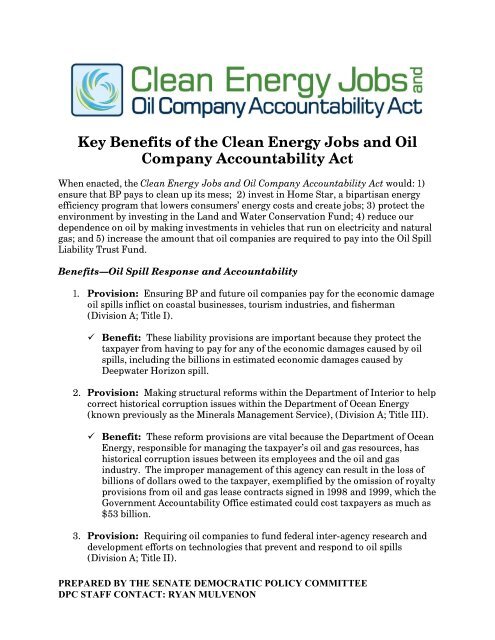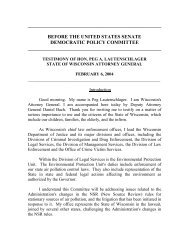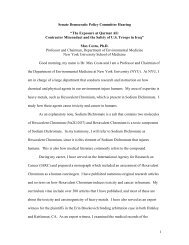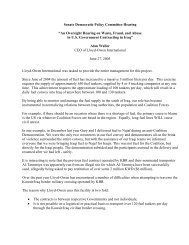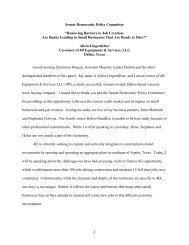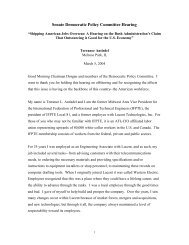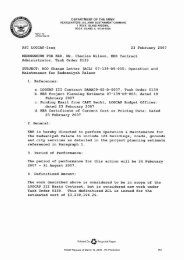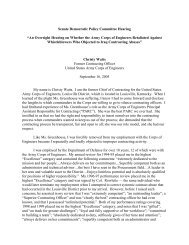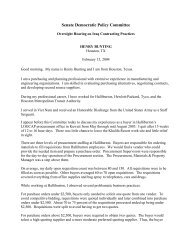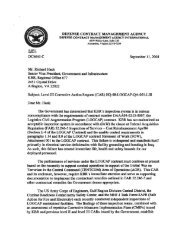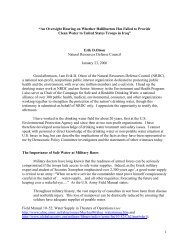Key Benefits of the Clean Energy Jobs and Oil Company ...
Key Benefits of the Clean Energy Jobs and Oil Company ...
Key Benefits of the Clean Energy Jobs and Oil Company ...
You also want an ePaper? Increase the reach of your titles
YUMPU automatically turns print PDFs into web optimized ePapers that Google loves.
<strong>Key</strong> <strong>Benefits</strong> <strong>of</strong> <strong>the</strong> <strong>Clean</strong> <strong>Energy</strong> <strong>Jobs</strong> <strong>and</strong> <strong>Oil</strong><br />
<strong>Company</strong> Accountability Act<br />
When enacted, <strong>the</strong> <strong>Clean</strong> <strong>Energy</strong> <strong>Jobs</strong> <strong>and</strong> <strong>Oil</strong> <strong>Company</strong> Accountability Act would: 1)<br />
ensure that BP pays to clean up its mess; 2) invest in Home Star, a bipartisan energy<br />
efficiency program that lowers consumers’ energy costs <strong>and</strong> create jobs; 3) protect <strong>the</strong><br />
environment by investing in <strong>the</strong> L<strong>and</strong> <strong>and</strong> Water Conservation Fund; 4) reduce our<br />
dependence on oil by making investments in vehicles that run on electricity <strong>and</strong> natural<br />
gas; <strong>and</strong> 5) increase <strong>the</strong> amount that oil companies are required to pay into <strong>the</strong> <strong>Oil</strong> Spill<br />
Liability Trust Fund.<br />
<strong>Benefits</strong>—<strong>Oil</strong> Spill Response <strong>and</strong> Accountability<br />
1. Provision: Ensuring BP <strong>and</strong> future oil companies pay for <strong>the</strong> economic damage<br />
oil spills inflict on coastal businesses, tourism industries, <strong>and</strong> fisherman<br />
(Division A; Title I).<br />
Benefit: These liability provisions are important because <strong>the</strong>y protect <strong>the</strong><br />
taxpayer from having to pay for any <strong>of</strong> <strong>the</strong> economic damages caused by oil<br />
spills, including <strong>the</strong> billions in estimated economic damages caused by<br />
Deepwater Horizon spill.<br />
2. Provision: Making structural reforms within <strong>the</strong> Department <strong>of</strong> Interior to help<br />
correct historical corruption issues within <strong>the</strong> Department <strong>of</strong> Ocean <strong>Energy</strong><br />
(known previously as <strong>the</strong> Minerals Management Service), (Division A; Title III).<br />
Benefit: These reform provisions are vital because <strong>the</strong> Department <strong>of</strong> Ocean<br />
<strong>Energy</strong>, responsible for managing <strong>the</strong> taxpayer’s oil <strong>and</strong> gas resources, has<br />
historical corruption issues between its employees <strong>and</strong> <strong>the</strong> oil <strong>and</strong> gas<br />
industry. The improper management <strong>of</strong> this agency can result in <strong>the</strong> loss <strong>of</strong><br />
billions <strong>of</strong> dollars owed to <strong>the</strong> taxpayer, exemplified by <strong>the</strong> omission <strong>of</strong> royalty<br />
provisions from oil <strong>and</strong> gas lease contracts signed in 1998 <strong>and</strong> 1999, which <strong>the</strong><br />
Government Accountability Office estimated could cost taxpayers as much as<br />
$53 billion.<br />
3. Provision: Requiring oil companies to fund federal inter-agency research <strong>and</strong><br />
development efforts on technologies that prevent <strong>and</strong> respond to oil spills<br />
(Division A; Title II).<br />
PREPARED BY THE SENATE DEMOCRATIC POLICY COMMITTEE<br />
DPC STAFF CONTACT: RYAN MULVENON
Benefit: These requirements would benefit coastal residents because <strong>the</strong>y<br />
will help ensure that oil companies meet <strong>the</strong>ir legal obligation to respond to<br />
oil spills <strong>and</strong> prevent <strong>the</strong> type economic damage caused by <strong>the</strong> Deepwater<br />
Horizon oil spill. This is important because <strong>the</strong> response by BP to Deepwater<br />
Horizon oil spill has revealed oil companies are using essentially <strong>the</strong> same<br />
technologies oil spill technologies that Exxon was using to respond to <strong>the</strong><br />
Exxon Valdez spill twenty years ago.<br />
4. Provision: Correcting antiquated maritime <strong>and</strong> admiralty laws that deny or<br />
significantly limit wrongful death claimants <strong>and</strong> deny <strong>the</strong> ability <strong>of</strong> decedents <strong>of</strong><br />
family members to recover non-pecuniary losses (Division A; Title V).<br />
Benefit: In <strong>the</strong> event that a wrongful death occurs <strong>of</strong>fshore, <strong>the</strong> negligent<br />
party could no longer deny or significantly limit wrongful death claimants<br />
from recovering non-pecuniary damages <strong>and</strong> will allow families to recover<br />
non-pecuniary losses (loss <strong>of</strong> care, comfort, <strong>and</strong> companionship).<br />
<strong>Benefits</strong>—<strong>Clean</strong> <strong>Energy</strong> Job Creation <strong>and</strong> Consumer Savings<br />
Provision: The Home Star program would provide $5 billion in residential energy <strong>and</strong><br />
water efficiency improvements (Division C).<br />
Benefit: Leveraging private investment in residential efficiency would<br />
support <strong>the</strong> construction <strong>and</strong> manufacturing sectors, while saving consumers<br />
money on <strong>the</strong>ir energy <strong>and</strong> water bills. The $5 billion <strong>of</strong> incentives for <strong>the</strong><br />
Home Star program, coupled with private investment, is estimated to<br />
generate three million home retr<strong>of</strong>its, 168,000 jobs, <strong>and</strong> reduce residential<br />
energy <strong>and</strong> water bills by $200 to $500 each year.<br />
<strong>Benefits</strong>—Reducing <strong>Oil</strong> Consumption <strong>and</strong> Pollution<br />
Provision: Promoting <strong>the</strong> purchase <strong>and</strong> use <strong>of</strong> Natural Gas Vehicles (Division<br />
B; Sections 2001-2005).<br />
Benefit: The combustion <strong>of</strong> natural gas is substantially cleaner than <strong>the</strong><br />
combustion <strong>of</strong> gasoline or diesel. Moreover, <strong>the</strong> EPA has found that when<br />
natural gas vehicles are compared against vehicles powered by diesel <strong>the</strong>y<br />
reduce carbon dioxide emissions 25 percent depending on <strong>the</strong> source <strong>of</strong> <strong>the</strong><br />
natural gas; significantly reduce carbon monoxide emissions; <strong>and</strong> reduce<br />
nitrogen oxide <strong>and</strong> volatile organic hydrocarbon emissions by 50 percent or<br />
more.<br />
In terms <strong>of</strong> oil savings, <strong>the</strong> natural gas industry has estimated that by <strong>the</strong><br />
third year <strong>of</strong> this program will be saving approximately 1.8 billion gallons <strong>of</strong><br />
oil annually <strong>and</strong> 18 billion gallons over 10 year vehicle life.<br />
PREPARED BY THE SENATE DEMOCRATIC POLICY COMMITTEE<br />
DPC STAFF CONTACT: RYAN MULVENON
The natural gas industry has also estimated that this program will create more<br />
than 100,000 direct manufacturing <strong>and</strong> labor jobs <strong>and</strong> more than 450,000<br />
indirect jobs.<br />
<strong>Benefits</strong>—Protecting <strong>the</strong> Environment<br />
Provision: Providing full funding for L<strong>and</strong> <strong>and</strong> Water Conservation Fund<br />
(LWCF) over <strong>the</strong> next five fiscal years (Division D).<br />
Benefit: Fully funding <strong>the</strong> LWCF help to fur<strong>the</strong>r support outdoor recreation<br />
which supports 6.5 million jobs, generates $88 billion in annual state <strong>and</strong><br />
national tax revenue, <strong>and</strong> $730 billion annually to <strong>the</strong> U.S. economy. The<br />
permanent funding provided to it by <strong>the</strong> <strong>Clean</strong> <strong>Energy</strong> <strong>Jobs</strong> <strong>and</strong> <strong>Oil</strong> <strong>Company</strong><br />
Accountability Act would give <strong>the</strong> LWCF <strong>the</strong> ability to begin address <strong>the</strong> $12<br />
billion backlog in eligible state projects, protect tens <strong>of</strong> thous<strong>and</strong>s more acres<br />
<strong>of</strong> l<strong>and</strong>, <strong>and</strong> leverage billions <strong>of</strong> dollars to protect <strong>the</strong> nation’s great outdoors.<br />
<strong>Benefits</strong>—<strong>Oil</strong> Spill Liability Trust Fund<br />
Provision: Increases <strong>the</strong> $1 billion liability cap <strong>of</strong> <strong>the</strong> <strong>Oil</strong> Spill Liability Trust<br />
Fund to $5 billion <strong>and</strong> <strong>the</strong> increases <strong>the</strong> amount that oil companies are required<br />
to pay into <strong>the</strong> <strong>Oil</strong> Spill Liability Trust Fund to 45 cents per barrel (Division E).<br />
Benefit: The maximum amount <strong>of</strong> money that may be withdrawn from <strong>the</strong><br />
Fund is $1 billion per incident. Currently, <strong>the</strong>re is approximately $1.5 billion<br />
in this trust fund. The nonpartisan Congressional Research Service has<br />
stated, “a major spill, particularly one in a sensitive environment, could<br />
threaten <strong>the</strong> viability <strong>of</strong> <strong>the</strong> fund.”<br />
PREPARED BY THE SENATE DEMOCRATIC POLICY COMMITTEE<br />
DPC STAFF CONTACT: RYAN MULVENON


